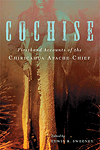
Cochise: Firsthand Accounts of the Chiricahua Apache Chief, edited by Edwin R. Sweeney, 2014, University of Oklahoma Press, Norman, $49.95
Those who have read independent scholar Ed Sweeney’s well-researched works—including Cochise: Chiricahua Apache Chief (1995) and From Cochise to Geronimo (2012)—might think they know far more about Cochise than the average reader. And they would be right. But there is more to learn, and Sweeney once again makes it easy. This latest offering collects some 55 Cochise-related documents from primary sources, only about a dozen of which were previously published. Sweeney admits that in his first Cochise book he suggested the Apaches were “warlike by nature.” Now he says he would argue the reverse. In 1858, the author notes, Cochise did not consider Americans his adversaries. Only when the Americans betrayed his trust did he go to war. To be specific, the brash actions of Lieutenant George Bascom at Apache Pass in 1861 were what prompted the change in Cochise. Sweeney’s first chapter includes reports, a couple from the lieutenant himself, about the Bascom Affair. Not that Cochise couldn’t be plenty warlike, especially when seeking vengeance. According to Sweeney, “In his day there was no better fighting Apache.”
Cochise was at war with Mexico or the United States for some 40 years. One of his best-known clashes with the Army came on July 15, 1862, when Cochise and fellow Chiricahua leader Mangas Coloradas ambushed the California column in Apache Pass. Albert J. Fountain was a sergeant during the fighting, and his account of the Battle of Apache Pass, first published in Las Cruces’ Rio Grande Republican of January 2, 1891, makes for most interesting reading. About a fifth of the documents presented here are from Cochise’s prime fighting years with the Americans (1861–69). Most of the remainder are from the period when a mellowed Cochise was more interested in peace with the United States. We hear from Oliver Otis Howard, the general who made a peace treaty at Dragoon Springs with Cochise in 1872, and accounts of that treaty by Captains Samuel Sumner and Joseph Haskell. The soldiers were greatly outnumbered. “But,” writes Haskell, “so completely had we trusted in the confidence of honesty that General Howard had placed in Cochise, that we felt perfectly safe in the hands of the worst tribe of Indians that exist.” On occasion Cochise himself is quoted in these documents. In a February 1873 interview Cochise tells Captain William Henry Brown: “I do not intend to let my young men do any wrong on this ground. I like the way in which you talk. I am glad of the peace, and my people rejoice at it.”
—Editor




